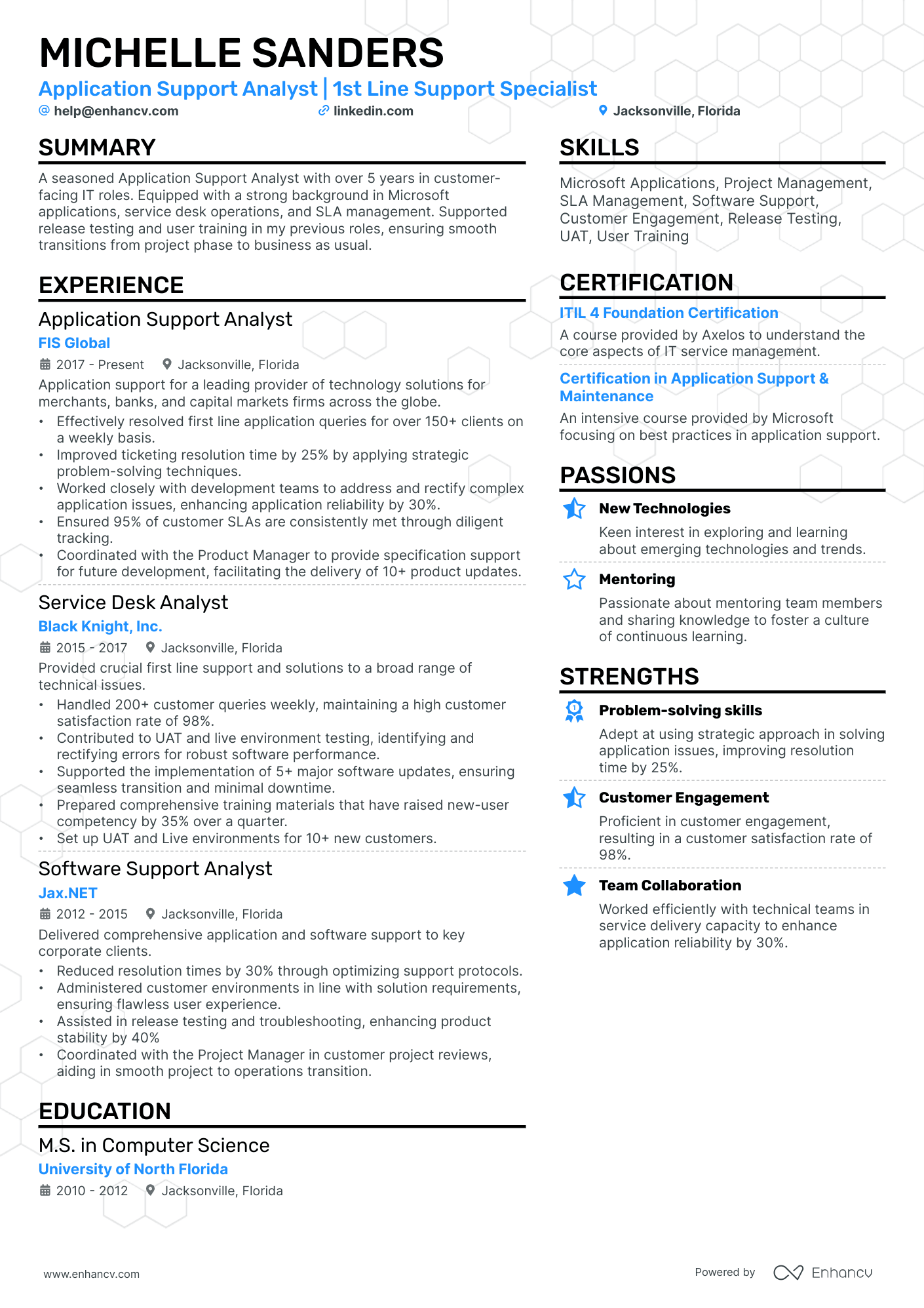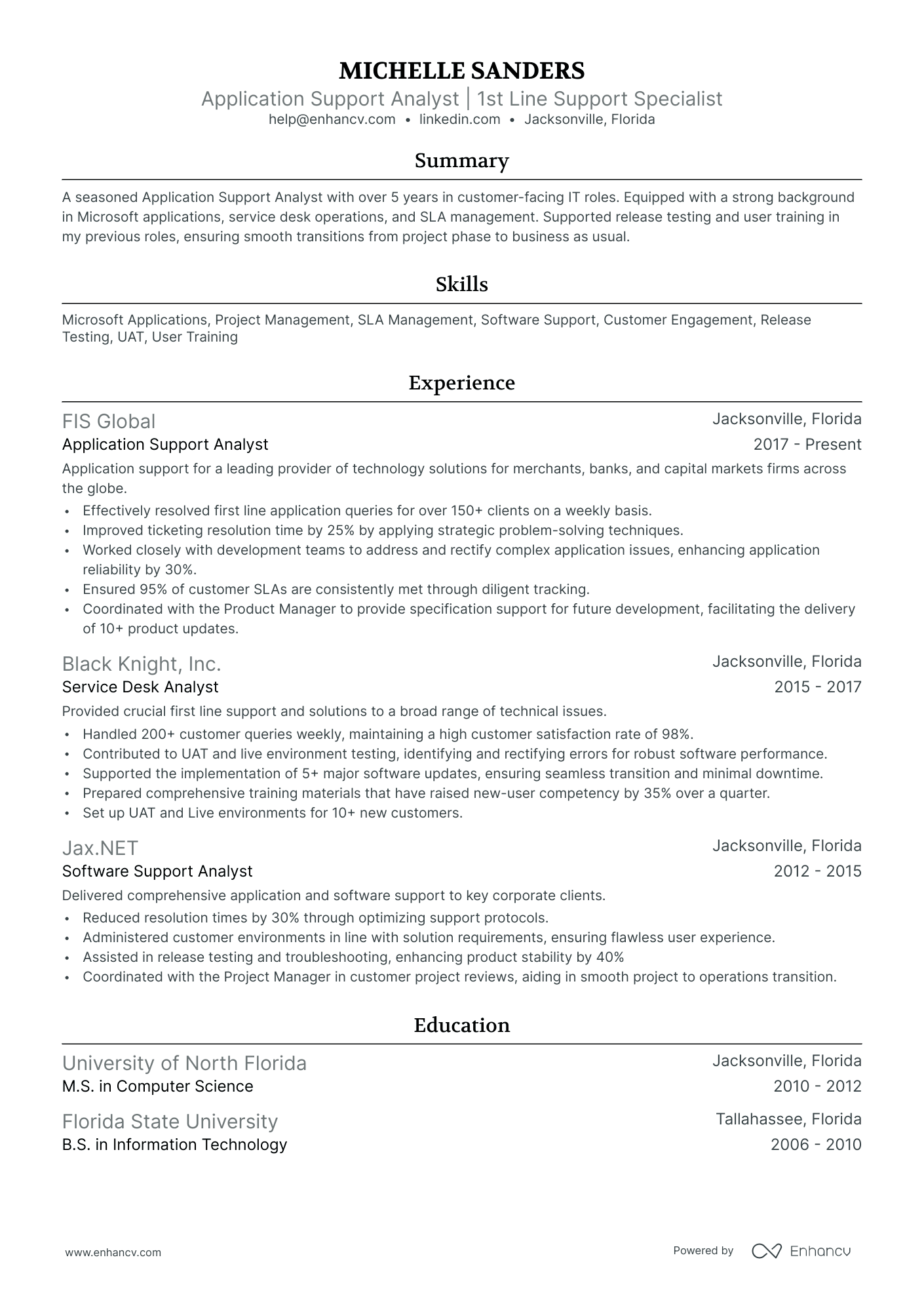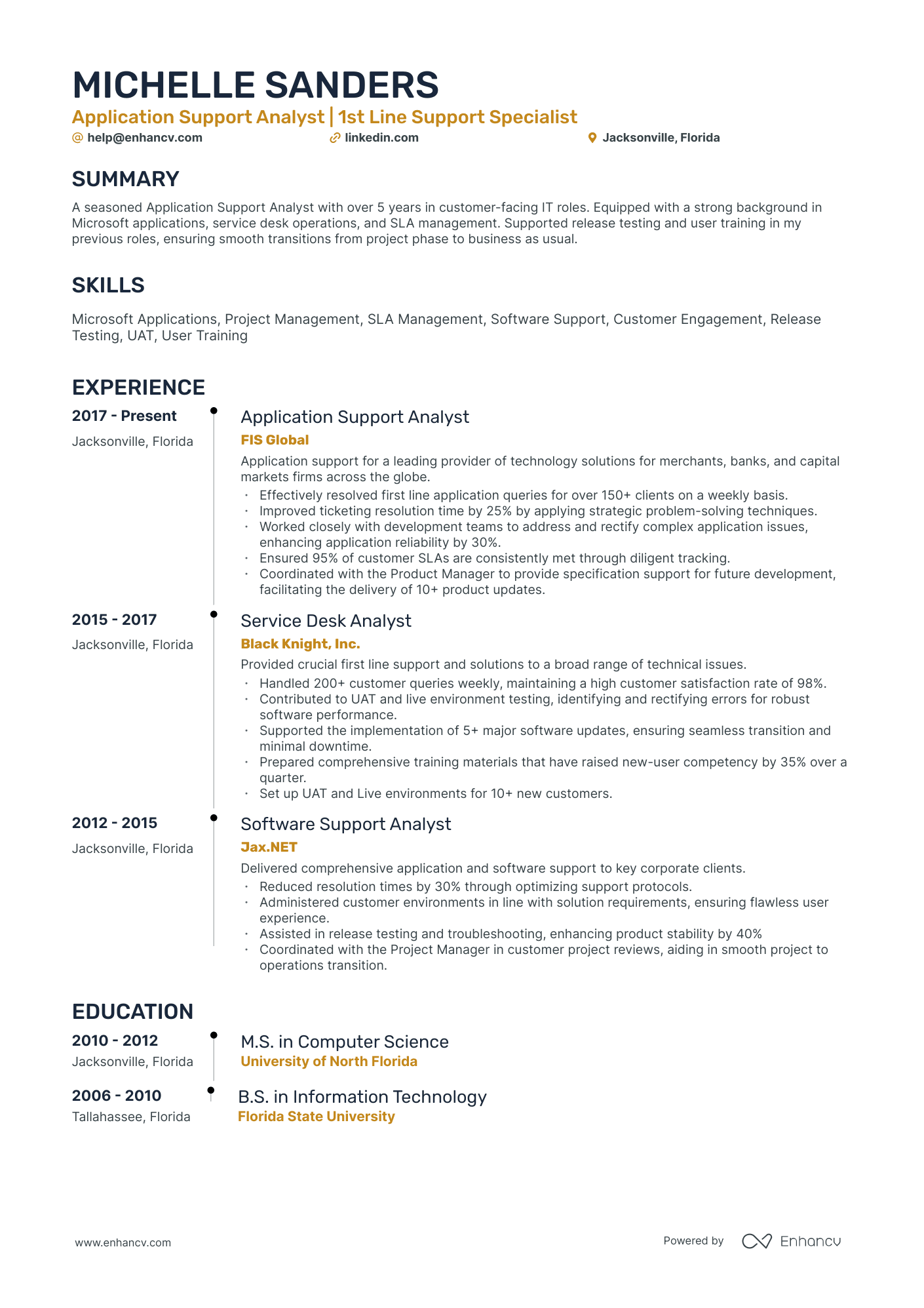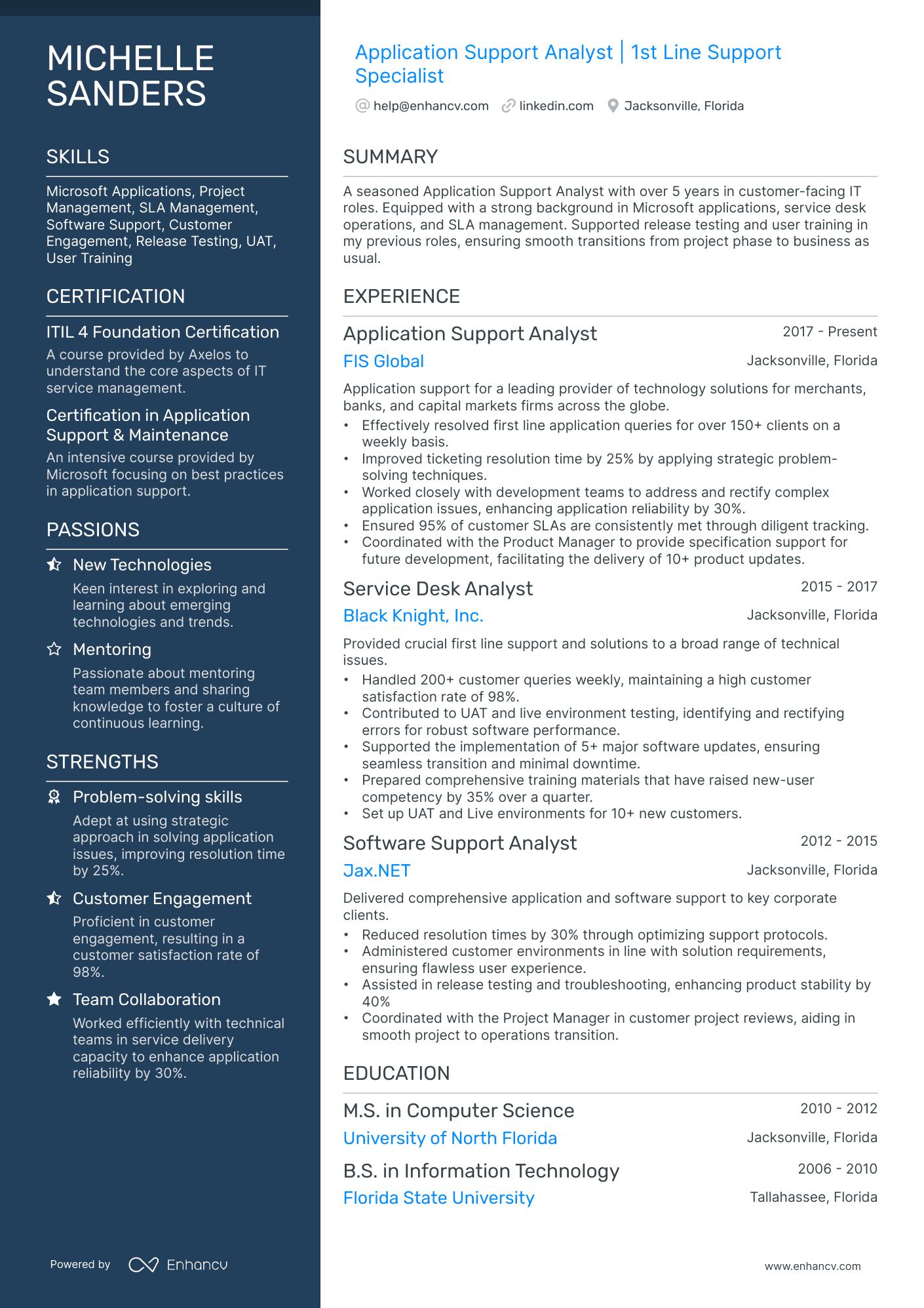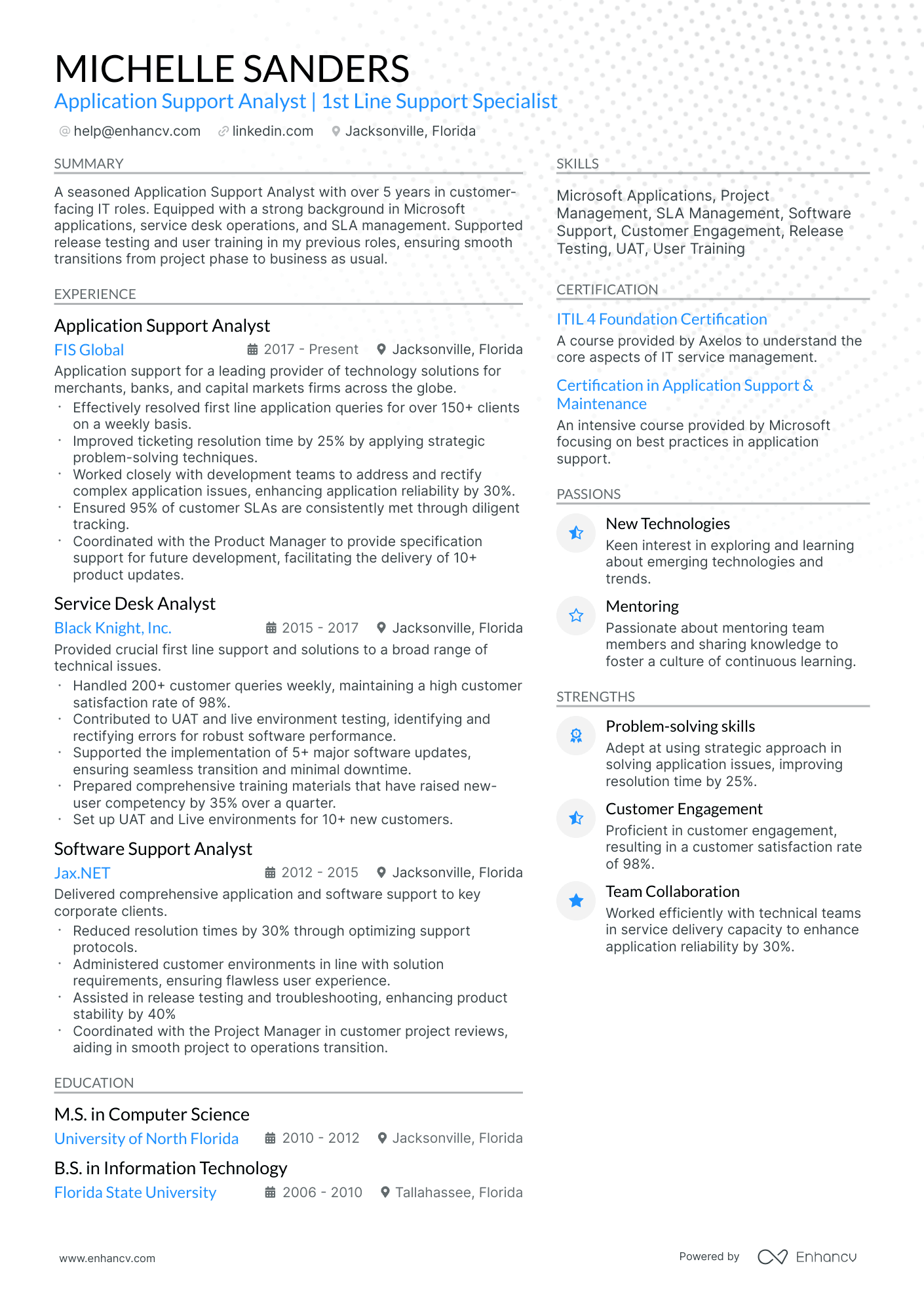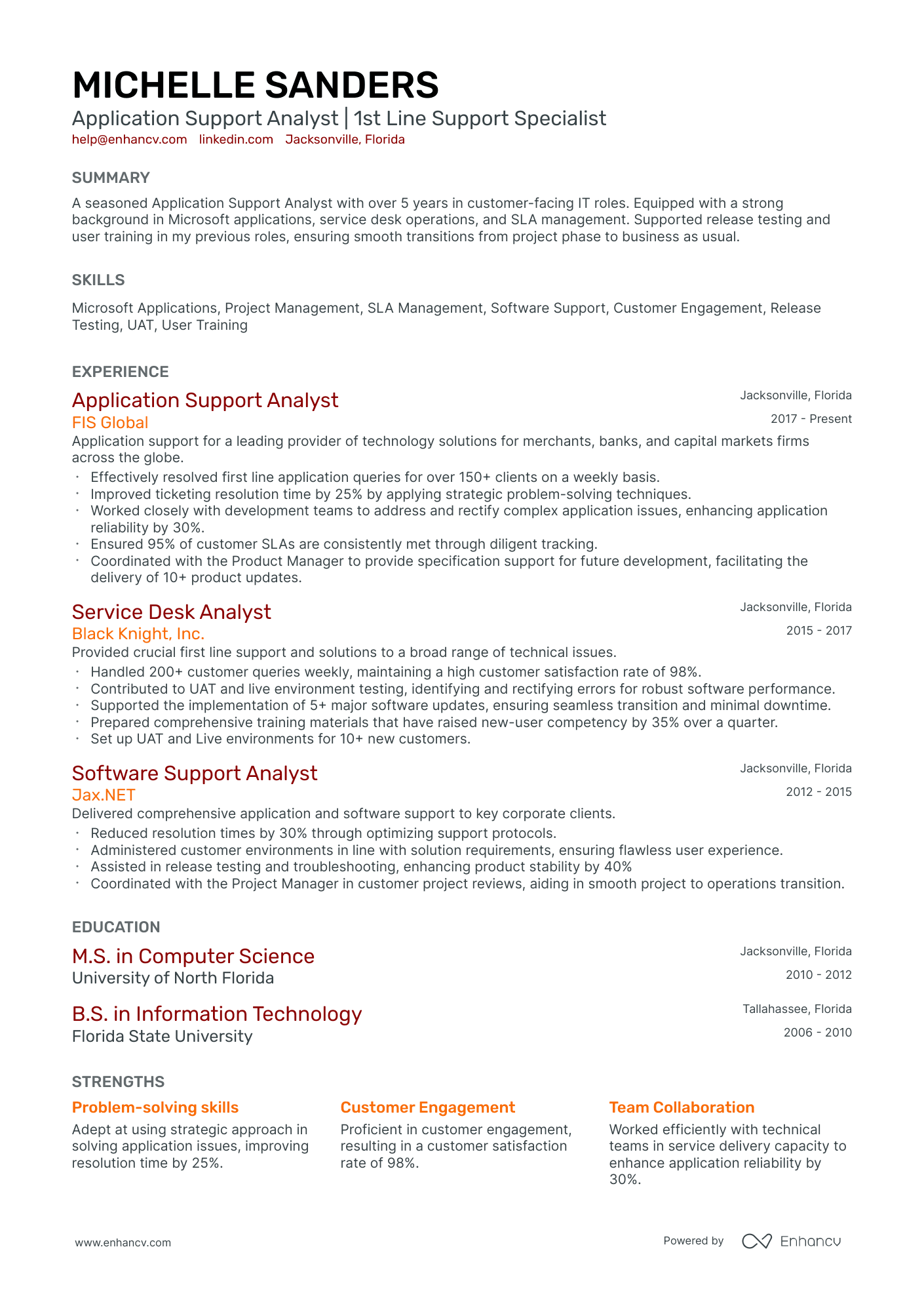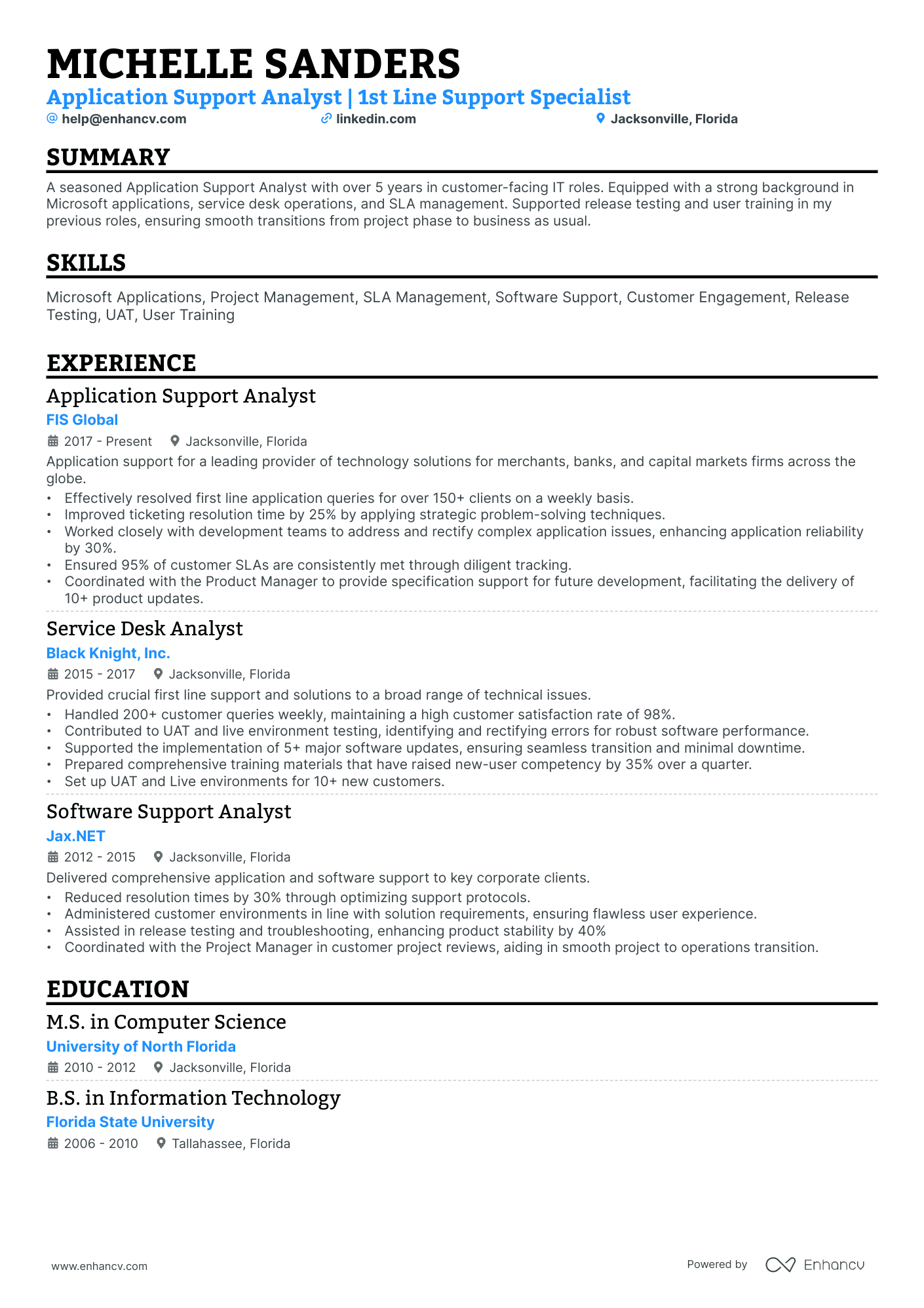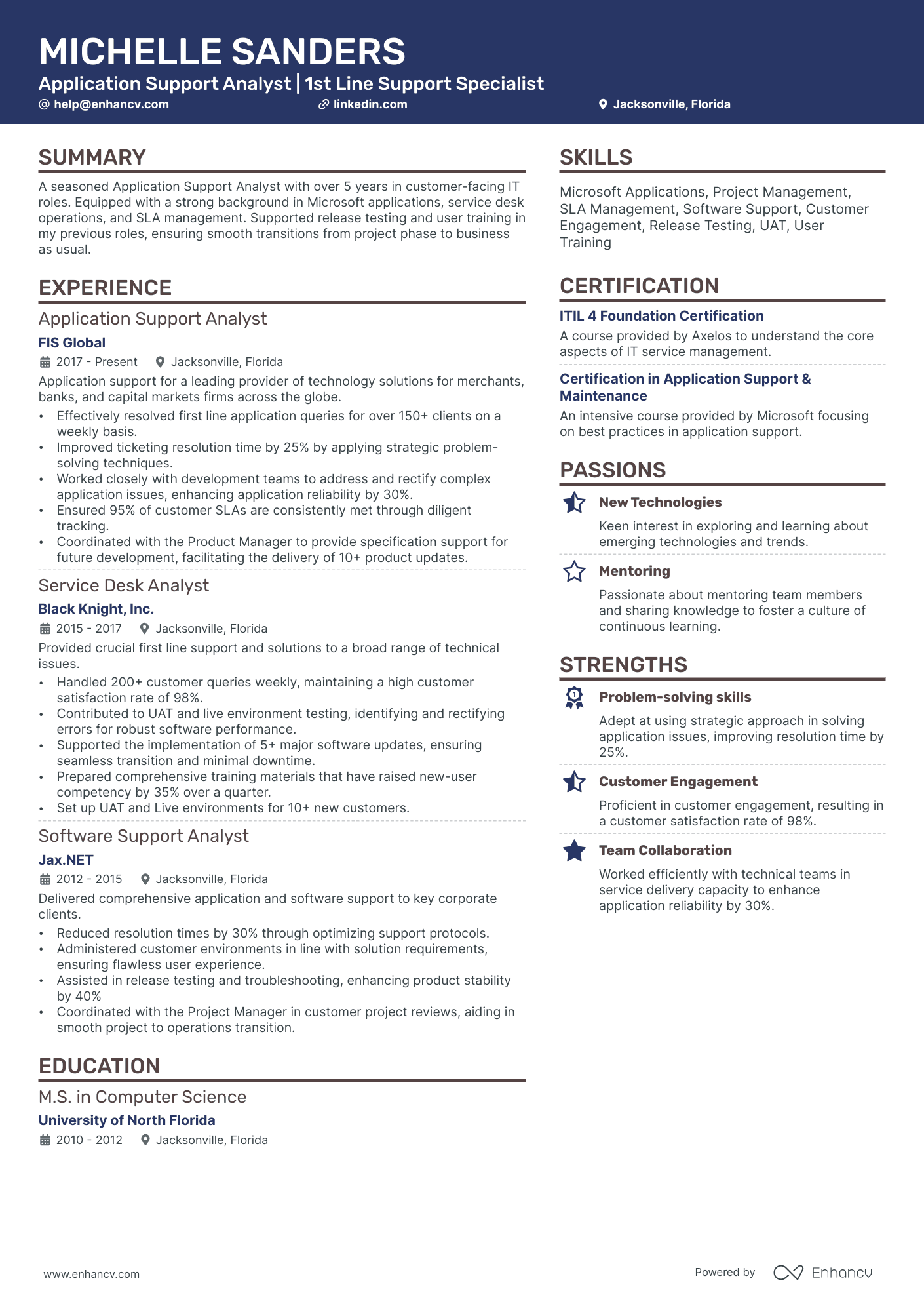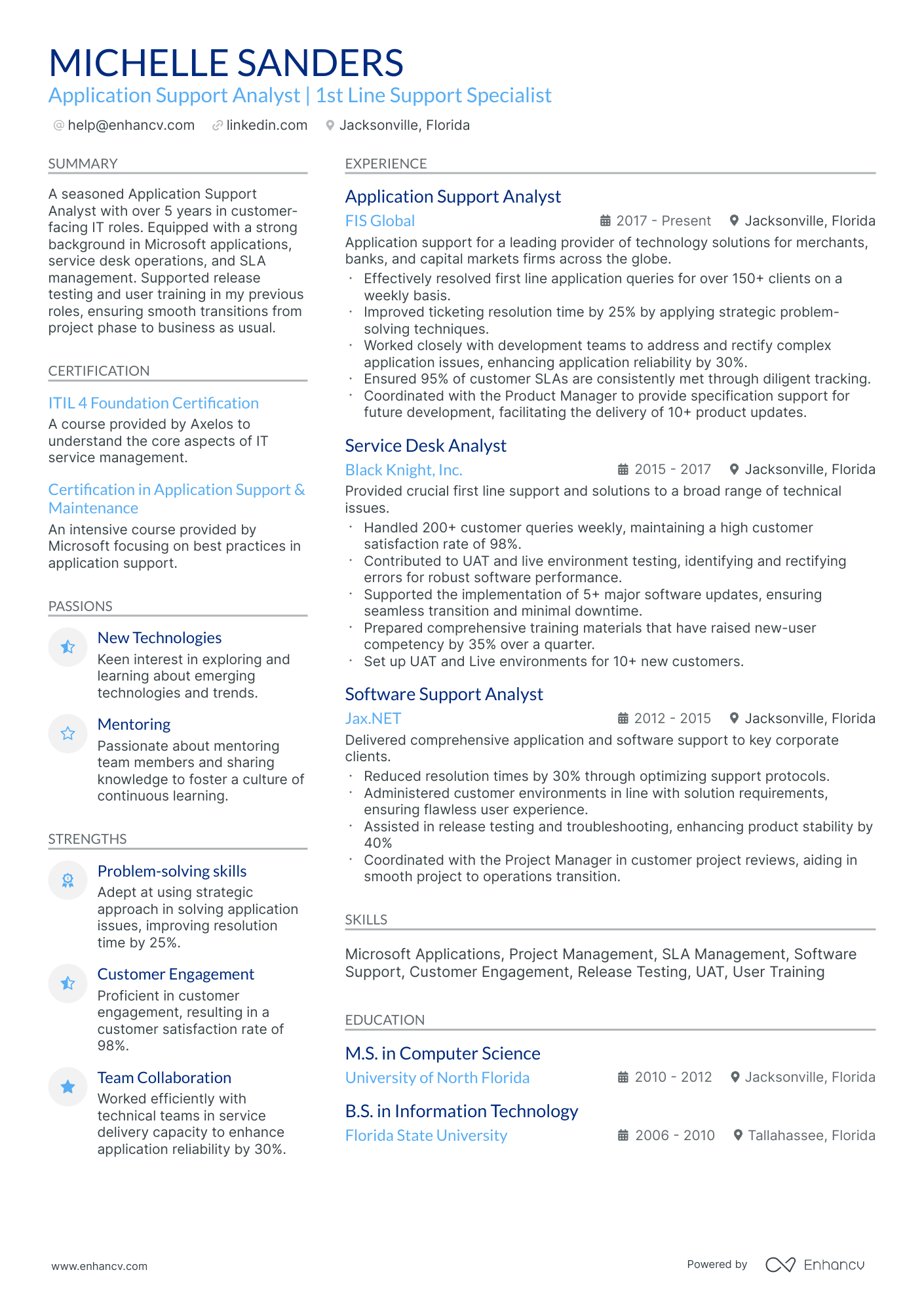Many application support analyst resume drafts fail because they list tickets, tools, and duties without proving impact. That gets filtered by ATS screening and lost in rapid recruiter scans, especially when competition is high.
A strong resume shows how you improved stability, speed, and user experience. Knowing how to make your resume stand out means you should quantify reduced incident volume, faster mean time to resolution, higher service level agreement compliance, fewer escalations, smoother releases, lower defect rates, and better adoption.
Key takeaways
- Quantify incident volume, resolution speed, and uptime gains instead of listing daily duties.
- Choose reverse-chronological format with direct experience or hybrid format without it.
- Mirror exact tools, frameworks, and terminology from each job posting in your bullets.
- Pair every listed skill with a measurable outcome in your experience section.
- Place certifications like ITIL 4 or CompTIA A+ near education to reinforce technical credibility.
- Use Enhancv's Bullet Point Generator to turn vague task descriptions into recruiter-ready achievements.
- Stop using AI once your resume accurately reflects real experience—never fabricate claims.
Job market snapshot for application support analysts
We analyzed 111 recent application support analyst job ads across major US job boards. These numbers help you understand employer expectations, industry demand, regional hotspots at a glance.
What level of experience employers are looking for application support analysts
| Years of Experience | Percentage found in job ads |
|---|---|
| 1–2 years | 2.7% (3) |
| 3–4 years | 11.7% (13) |
| 5–6 years | 9.0% (10) |
| 7–8 years | 1.8% (2) |
| 10+ years | 0.9% (1) |
| Not specified | 73.0% (81) |
Application support analyst ads by area of specialization (industry)
| Industry (Area) | Percentage found in job ads |
|---|---|
| Finance & Banking | 64.0% (71) |
| Healthcare | 30.6% (34) |
Top companies hiring application support analysts
| Company | Percentage found in job ads |
|---|---|
| Jack Henry & Associates Inc. | 33.3% (37) |
| Sanford Health | 19.8% (22) |
Role overview stats
These tables show the most common responsibilities and employment types for application support analyst roles. Use them to align your resume with what employers expect and to understand how the role is structured across the market.
Day-to-day activities and top responsibilities for a application support analyst
| Responsibility | Percentage found in job ads |
|---|---|
| Sql | 22.5% (25) |
| Itil | 21.6% (24) |
| Training | 13.5% (15) |
| Customer support | 12.6% (14) |
| Data conversion | 12.6% (14) |
| Software installation | 12.6% (14) |
| Application support | 10.8% (12) |
| Microsoft office | 10.8% (12) |
| Epic | 9.9% (11) |
| Agile | 7.2% (8) |
| Reporting | 7.2% (8) |
| Troubleshooting | 7.2% (8) |
Type of employment (remote vs on-site vs hybrid)
| Employment type | Percentage found in job ads |
|---|---|
| On-site | 43.2% (48) |
| Remote | 36.0% (40) |
| Hybrid | 20.7% (23) |
How to format a application support analyst resume
Recruiters hiring for application support analyst roles prioritize troubleshooting ability, familiarity with ticketing and monitoring tools, and clear evidence that you can resolve issues efficiently while communicating with end users and technical teams. The right resume format ensures these signals—technical skills, support experience, and measurable resolution outcomes—appear quickly and clearly for both human reviewers and applicant tracking systems.
I have significant experience in this role—which format should I use?
Use a reverse-chronological format to present your support experience in a clear, linear timeline that highlights growing responsibility and deepening technical expertise. Do:
- Lead each role entry with your scope of ownership: number of applications supported, user base size, and escalation tier level.
- Feature role-specific tools and domains prominently—ITIL frameworks, SQL, JIRA, ServiceNow, application monitoring platforms, and ERP or CRM systems you've supported.
- Quantify outcomes tied to resolution efficiency, system uptime, SLA adherence, or user satisfaction improvements.
I'm junior or switching into this role—what format works best?
A hybrid format works best because it lets you lead with a focused skills section while still showing relevant experience or project work in chronological order. Do:
- Place a dedicated technical skills section near the top of your resume, listing tools like SQL, JIRA, ServiceNow, and any application platforms you've worked with.
- Include academic projects, lab environments, internships, or helpdesk roles that demonstrate hands-on troubleshooting and user support, even if they weren't formal application support positions.
- Connect every action to a clear outcome so recruiters can see your problem-solving impact, not just task completion.
Why not use a functional resume?
A functional resume strips away the timeline and context recruiters need to evaluate how you've applied your troubleshooting and support skills in real working environments, making it harder to verify your experience depth or progression.
- You're re-entering the workforce after a gap and need to foreground transferable technical skills like SQL, ticketing systems, or diagnostic methodologies while your recent work history is limited.
- You're transitioning from a related role (helpdesk technician, QA tester, or database administrator) and want to emphasize overlapping skills before detailing unrelated job titles.
Now that you've established a clean, readable layout, it's time to fill it with the right sections that showcase your qualifications as an application support analyst.
What sections should go on a application support analyst resume
Recruiters expect a clean, role-specific resume that proves you can troubleshoot, support users, and improve application reliability. Understanding which resume sections to include is critical for maximum clarity.
Use this structure:
- Header
- Summary
- Experience
- Skills
- Projects
- Education
- Certifications
- Optional sections: Awards, Open-source work, Languages
Strong experience bullets should emphasize incident volume and severity, resolution time improvements, root cause analysis, stakeholder impact, and measurable reliability gains.
Is your resume good enough?
Drop your resume here or choose a file. PDF & DOCX only. Max 2MB file size.
Once you’ve organized your resume with the right components, the next step is to write your application support analyst experience section so each role clearly supports that structure.
How to write your application support analyst resume experience
Your work experience section should highlight the support issues you resolved, the application environments you maintained, and the measurable improvements you drove for end users and business stakeholders. Hiring managers prioritize demonstrated impact—faster resolution times, fewer recurring incidents, improved system uptime—over descriptive task lists that merely catalog daily responsibilities.
Each entry should include:
- Job title
- Company and location (or remote)
- Dates of employment (month and year)
Three to five concise bullet points showing what you owned, how you executed, and what outcomes you delivered:
- Ownership scope: the applications, platforms, environments, or user populations you were directly responsible for supporting, including the breadth of systems and the complexity of the support tier.
- Execution approach: the diagnostic tools, ticketing systems, monitoring platforms, scripting languages, or troubleshooting frameworks you used to identify root causes, escalate issues, and deliver timely resolutions.
- Value improved: the changes you drove in incident response times, application uptime, ticket backlog reduction, system reliability, or user satisfaction as a direct result of your support work.
- Collaboration context: how you partnered with development teams, infrastructure engineers, QA analysts, vendors, or business users to triage defects, coordinate releases, or implement configuration changes.
- Impact delivered: the tangible outcomes your work produced—expressed through reduced downtime, improved service-level agreement adherence, lower escalation rates, or enhanced application stability—rather than a summary of routine tasks.
Experience bullet formula
A application support analyst experience example
✅ Right example - modern, quantified, specific.
Application Support Analyst
BrightPay Systems | Remote
2022–Present
Supported a cloud-based payments and invoicing platform serving 120,000+ small business users in the United States.
- Resolved 35–45 weekly incidents and service requests in ServiceNow, cutting mean time to resolution by 28% by standardizing triage workflows, severity definitions, and escalation paths.
- Diagnosed complex application issues using Splunk, SQL, and Kibana, reducing recurring payment reconciliation defects by 22% through root cause analysis and targeted fixes coordinated with engineers.
- Automated log collection, health checks, and user access audits with Python and PowerShell, saving eight hours per week and improving first-contact resolution from 62% to 74%.
- Improved release readiness by validating changes in Jira against acceptance criteria, running smoke tests, and partnering with product managers and quality assurance to reduce post-release incidents by 19%.
- Strengthened compliance and access controls by tightening role-based permissions in Okta and documenting change approvals in Confluence, lowering unauthorized access exceptions by 31%.
Now that you've seen what a strong experience section looks like in practice, let's break down how to adapt yours for each specific job posting.
How to tailor your application support analyst resume experience
Recruiters evaluate your application support analyst resume through applicant tracking systems and manual review. Tailoring your resume to the job description ensures your qualifications stand out in both processes.
Ways to tailor your application support analyst experience:
- Match specific ticketing platforms and monitoring tools named in the posting.
- Mirror the exact terminology used for incident management processes.
- Reflect service level agreements or resolution time KPIs referenced.
- Highlight experience with the industry or domain the employer operates in.
- Emphasize system reliability or uptime standards when the role requires them.
- Align your troubleshooting workflows with frameworks the job description lists.
- Reference collaboration with development or infrastructure teams if mentioned.
- Include compliance or security protocols relevant to the posted requirements.
Tailoring means aligning your real accomplishments with what the employer values—not forcing unrelated keywords into your experience.
Resume tailoring examples for application support analyst
| Job description excerpt | Untailored | Tailored |
|---|---|---|
| Provide Level 2 support for enterprise applications including SAP and ServiceNow, troubleshoot incidents, and escalate unresolved issues per ITIL frameworks. | Helped resolve technical issues and supported various software applications for end users. | Delivered Level 2 support for SAP ERP and ServiceNow across 3,000+ users, troubleshooting and resolving 85% of incidents within SLA targets using ITIL-aligned escalation procedures. |
| Monitor application performance using Splunk and Dynatrace, identify recurring errors, and collaborate with development teams to deploy permanent fixes. | Monitored systems and worked with other teams to fix application problems. | Monitored application health in Splunk and Dynatrace, identified recurring transaction errors in the payments module, and partnered with developers to deploy fixes that reduced repeat incidents by 40%. |
| Write and maintain SQL queries to extract data for troubleshooting, generate support reports, and validate data integrity across integrated systems. | Performed data tasks and created reports for the support team as needed. | Wrote and optimized SQL queries across Oracle and MS SQL Server databases to troubleshoot data discrepancies, generate weekly support trend reports, and validate data integrity across five integrated systems. |
Once you’ve aligned your experience with the role’s priorities, quantify your achievements to show the measurable impact behind that fit.
How to quantify your application support analyst achievements
Quantifying your achievements shows how your support work improves stability, speed, and user outcomes. Focus on incident volume, resolution time, uptime, defect reduction, change success, and risk reduction across key applications.
Quantifying examples for application support analyst
| Metric | Example |
|---|---|
| Incident throughput | "Resolved 45 to 60 tickets weekly in ServiceNow, keeping first-response time under 20 minutes for two business-critical applications." |
| Resolution speed | "Cut mean time to resolution from 6.2 hours to 3.8 hours by improving runbooks and using Splunk dashboards to isolate root causes faster." |
| Reliability | "Improved monthly uptime from 99.3% to 99.85% by fixing recurring job failures and adding alerting for five scheduled integrations." |
| Change quality | "Raised change success rate from 92% to 98% by tightening release checklists and coordinating UAT sign-off with QA and product." |
| Security risk | "Reduced access violations by 70% by auditing role-based access in Active Directory and removing stale permissions for 120 users." |
Turn vague job duties into measurable, recruiter-ready resume bullets in seconds with Enhancv's Bullet Point Generator.
Once you've crafted strong bullet points for your experience section, you'll want to apply that same precision to presenting your hard and soft skills on your application support analyst resume.
How to list your hard and soft skills on a application support analyst resume
Your skills section shows you can diagnose incidents, support business-critical applications, and work within service processes, and recruiters and ATS scan this section for keyword matches; aim for a balanced mix of technical hard skills and role-specific soft skills.
application support analyst roles require a blend of:
- Product strategy and discovery skills.
- Data, analytics, and experimentation skills.
- Delivery, execution, and go-to-market discipline.
- Soft skills.
Your skills section should be:
- Scannable (bullet-style grouping).
- Relevant to the job post.
- Backed by proof in experience bullets.
- Updated with current tools.
Place your skills section:
- Above experience if you're junior or switching careers.
- Below experience if you're mid/senior with strong achievements.
Hard skills
- ServiceNow, Jira Service Management
- ITIL incident, problem, change
- SLA, SLO, KPI tracking
- Root cause analysis (RCA)
- SQL querying and joins
- Log analysis, Splunk, ELK
- Monitoring: Datadog, New Relic
- API troubleshooting: REST, Postman
- Linux command line, shell basics
- Windows Server, Active Directory
- Release support, deployment validation
- Knowledge base documentation, runbooks
Soft skills
- Triage and prioritize incidents
- Translate technical issues for users
- Ask targeted diagnostic questions
- Set clear expectations on timelines
- Coordinate cross-team resolution
- Escalate with complete context
- Own issues through closure
- Document fixes and prevention steps
- Communicate status updates consistently
- Make risk-based tradeoffs fast
- Stay calm under production pressure
- Improve processes after incidents
How to show your application support analyst skills in context
Skills shouldn't live only in a bulleted list on your resume. Explore curated resume skills examples to see how top candidates present their abilities effectively.
They should be demonstrated in:
- Your summary (high-level professional identity)
- Your experience (proof through outcomes)
Here's what strong, skills-rich resume content looks like in practice.
Summary example
Application support analyst with eight years in healthcare IT, specializing in ServiceNow, SQL-based troubleshooting, and EHR integrations. Reduced average ticket resolution time by 34% through streamlined escalation workflows and cross-functional collaboration with development teams.
- Reflects senior-level experience clearly
- Names role-relevant tools directly
- Includes a concrete, measurable outcome
- Highlights collaboration as a soft skill
Experience example
Senior Application Support Analyst
Meridian Health Systems | Remote
March 2019–August 2024
- Diagnosed and resolved 500+ monthly Tier 2/3 incidents using SQL queries and Splunk log analysis, cutting mean resolution time by 28%.
- Partnered with DevOps and QA teams to deploy application patches across 12 clinical platforms, reducing recurring defects by 41%.
- Built a Confluence-based internal knowledge base documenting 200+ troubleshooting procedures, decreasing new analyst onboarding time by three weeks.
- Every bullet includes measurable proof
- Skills appear naturally within real accomplishments
Once you’ve demonstrated your application support analyst strengths through real examples, the next step is to apply that same approach to writing an application support analyst resume with no experience so employers can still see your value.
How do I write a application support analyst resume with no experience
Even without full-time experience, you can demonstrate readiness through:
- Help desk ticketing in school labs
- Technical support for student clubs
- Personal homelab troubleshooting and documentation
- Customer support role with escalations
- IT coursework with capstone projects
- Volunteer system admin for nonprofits
- QA bug reports and reproduction steps
- Internship shadowing application support analyst
If you're starting out, our guide on writing a resume without work experience covers strategies to showcase your value effectively.
Focus on:
- Ticket metrics and SLA awareness
- Troubleshooting steps and runbooks
- SQL queries and log analysis
- Clear incident notes and escalations
Resume format tip for entry-level application support analyst
Use a hybrid resume format because it highlights relevant skills and projects while still showing work history, even if it is unrelated. Do:
- Add a "Projects" section above experience.
- Mirror common application support analyst keywords in job posts.
- Quantify outcomes: tickets, time saved, error rate.
- List tools used: Jira, ServiceNow, SQL.
- Show incident workflow: triage, reproduce, escalate.
- Built a Jira ticket workflow for a student lab, documented triage steps, and cut average issue resolution time from two days to one day.
Even without hands-on experience, your education section can demonstrate the technical knowledge and analytical skills employers look for in an application support analyst.
How to list your education on a application support analyst resume
Your education section helps hiring teams confirm you have the foundational technical and analytical knowledge needed for an application support analyst role. It builds credibility fast.
Include:
- Degree name
- Institution
- Location
- Graduation year
- Relevant coursework (for juniors or entry-level candidates)
- Honors & GPA (if 3.5 or higher)
Skip month and day details—list the graduation year only.
Here's a strong education entry tailored for an application support analyst resume.
Example education entry
Bachelor of Science in Information Systems
George Mason University, Fairfax, VA
Graduated 2021
GPA: 3.7/4.0
- Relevant Coursework: Database Management, Systems Administration, IT Service Management, Network Fundamentals, Technical Communication
- Honors: Dean's List (six semesters), Magna Cum Laude
How to list your certifications on a application support analyst resume
Certifications on your resume show your commitment to learning, prove tool proficiency, and signal industry relevance for an application support analyst, especially when your experience spans multiple platforms and processes. Include:
- Certificate name
- Issuing organization
- Year
- Optional: credential ID or URL
- List certifications below education when they are older, general, or less relevant than your degree and recent application support analyst experience.
- List certifications above education when they are recent, role-specific, or required for the application support analyst roles you target.
Best certifications for your application support analyst resume
ITIL 4 Foundation CompTIA A+ CompTIA Network+ CompTIA Security+ Microsoft Certified: Azure Fundamentals Microsoft Certified: Windows Server Hybrid Administrator Associate ServiceNow Certified System Administrator
Once you’ve placed your credentials where recruiters can spot them quickly, focus on writing your application support analyst resume summary to connect those qualifications to the role’s requirements upfront.
How to write your application support analyst resume summary
Your resume summary is the first thing a recruiter reads. A strong one instantly signals you're qualified for the application support analyst role.
Keep it to three to four lines, with:
- Your title and relevant years of experience in application support or IT operations.
- The domain or industry you've worked in, such as healthcare, finance, or SaaS.
- Core tools and skills like SQL, ITIL, ServiceNow, or JIRA.
- One or two measurable achievements, such as reduced ticket resolution time or improved uptime.
- Soft skills tied to real outcomes, like cross-team communication that shortened escalation cycles.
PRO TIP
At this level, emphasize technical proficiency, relevant tools, and early wins that show impact. Highlight specific platforms you've supported and measurable contributions. Avoid vague phrases like "passionate problem-solver" or "motivated team player." Recruiters want proof of what you've done, not personality descriptors.
Example summary for a application support analyst
Application support analyst with three years of experience troubleshooting enterprise SaaS platforms using SQL and ServiceNow. Reduced average ticket resolution time by 30% through improved triage workflows and cross-team coordination.
Optimize your resume summary and objective for ATS
Drop your resume here or choose a file.
PDF & DOCX only. Max 2MB file size.
Now that your summary effectively communicates your value, make sure the header above it presents your contact details correctly so recruiters can actually reach you.
What to include in a application support analyst resume header
A resume header lists your key contact and professional links, helping application support analyst candidates boost visibility, credibility, and recruiter screening speed.
Essential resume header elements
- Full name
- Tailored job title and headline
- Location
- Phone number
- Professional email
- GitHub link
- Portfolio link
A LinkedIn link helps recruiters verify your experience quickly and supports screening.
Do not include a photo on a application support analyst resume unless the role is explicitly front-facing or appearance-dependent.
Match your header title to the job posting and keep formatting consistent so recruiters can scan and contact you fast.
Application support analyst resume header
Jordan Lee
Application Support Analyst | Incident triage, ticketing, and SQL troubleshooting
Austin, TX
(512) 555-01XX
jordan.lee@enhancv.com
github.com/jordanlee
yourwebsite.com
linkedin.com/in/jordanlee
Once your contact details and role-focused identifiers are in place at the top, add the following additional sections to round out your application support analyst resume with relevant supporting information.
Additional sections for application support analyst resumes
When your core qualifications match other candidates, well-chosen additional sections can set your application support analyst resume apart. For example, listing language skills on your resume can be especially valuable if you support users across multiple regions.
- Languages
- Certifications and training
- Technical projects
- Volunteer experience in IT support
- Professional associations and memberships
- Hobbies and interests
- Publications or technical blog contributions
Once you've rounded out your resume with relevant additional sections, the next step is pairing it with a strong cover letter to maximize your application's impact.
Do application support analyst resumes need a cover letter
A cover letter isn't required for an application support analyst, but it helps when roles are competitive or hiring managers expect context. If you're unsure where to start, learn what a cover letter is and how it complements your resume. It can make a difference when your resume doesn't clearly show product fit, stakeholder experience, or incident ownership.
Use a cover letter to add context your resume can't:
- Explain role and team fit by matching your support model experience to their setup, like on-call rotations, service-level agreements, and escalation paths.
- Highlight one or two relevant projects or outcomes, such as reducing ticket backlog, improving first-contact resolution, or speeding up incident triage.
- Show understanding of the product, users, and business context by naming user groups, workflows, and how you protect uptime and customer experience.
- Address career transitions or non-obvious experience by connecting prior roles to application support analyst work, like troubleshooting, communication, and root cause analysis.
Drop your resume here or choose a file.
PDF & DOCX only. Max 2MB file size.
After you decide whether to include a cover letter to add context beyond your resume, you can use AI to improve your application support analyst resume by sharpening its content and alignment.
Using AI to improve your application support analyst resume
AI can sharpen your resume's clarity, structure, and impact. It helps refine bullet points, tighten language, and highlight results. But overuse strips authenticity. Once your content is clear and role-aligned, step away from AI. If you're exploring tools, check out which AI is best for writing resumes to find the right fit for your workflow.
Here are 10 practical prompts to strengthen specific sections of your application support analyst resume:
Sharpen your summary
Quantify experience bullets
Align skills precisely
Strengthen action verbs
Tighten project descriptions
Refine certification relevance
Improve technical clarity
Tailor education details
Eliminate redundancy
Target job descriptions
Conclusion
A strong application support analyst resume highlights measurable outcomes, role-specific skills, and a clear structure. It shows how you reduced ticket volume, improved resolution time, and increased system uptime using sharp troubleshooting, communication, and documentation.
Keep your resume easy to scan with focused sections, consistent formatting, and results tied to tools and processes you used. This approach matches today’s hiring market and keeps you ready as support work shifts toward automation and stronger reliability expectations.
